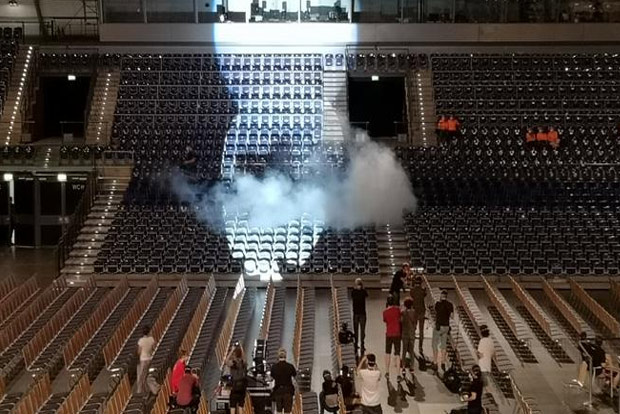Begin typing your search...
Rekindling light and sound: Germany’s concert gambit to help arenas hold large gigs again
“We felt that a study on how cultural events could somehow possibly keep going was a cool idea and that’s why we registered,” said Kira and Felix Stutz.

Chennai
Spending an entire day in a huge crowd in an arena might not seem like the best plan at the moment, especially considering that the number of new coronavirus cases in Germany has surged up to more than 2,000 within 24 hours — a high that had not been seen since the end of April, when strict restrictions still applied throughout the country.
Yet that is exactly what happened on Saturday in Leipzig, as volunteers lined up early on a rainy morning to take part in a study called RESTART-19, which had participants attend a series of concert simulations, and having them follow three different scenarios with varying admission and seating plans.
The ambitious event, organised by the University Medical Center of Halle, was held to collect data on crowd behavior in and around the arena to better assess the risk associated with holding such large events in the future, as Michael Gekle, dean of the medical faculty at the Halle University said. He hopes that the data will “contribute to national decisions as to whether an event should take place or not, thanks to reliable predictions as to the risk of additional infections related to such an event.”
Safer than taking the train
For Kira and Felix, it felt “safer than travelling by train through Germany, for instance.” In fact, the measures applied for the selection of the project’s participants were way stricter than in everyday contexts. Every participant had to test for COVID-19 48 hours ahead of the event and could only participate with a negative result; people with symptoms or recently returning from a high-risk country were not allowed to take part. On the morning of the study, the participants’ temperature was taken before they were handed an FFP2 mask, which blocks respiratory droplets through which the disease could be transmitted, as well as a contact tracer to track their movements, and a bottle of disinfectant mixed with a fluorescent marking spray to determine the surfaces they’d touch throughout the day.
Even though there was only a third of the 4,200 volunteers the organisers had initially hoped to get together, study director Stefan Moritz said that he was “very satisfied with the quality of the data they had collected” throughout the day from the 1,500 participants’ tracking devices. “It’s a database with which we will be able to work very well.”
It will take several weeks to develop results based on this data; findings are to be made public in September, added Moritz. This is the first study of its kind, according to professor Gekle. Before the pandemic, this was not the type of question researchers were focusing on, and allowing such a large-scale event to take place for research purposes was not an option earlier on in the pandemic, when the ways the virus could spread were still unknown. The organisers of the Leipzig study have been contacted by three other universities from Australia, Belgium and Denmark that are also undertaking similar projects; this will help strengthen their own research, said Moritz.
Ahead of the study, which cost nearly $1.2 mn, critics were quick to dismiss its potential findings, since it does not reflect the real conditions of normal concerts, with people drinking alcohol and singing along without wearing a high-filter mask. “That’s the problem of every study, that it’s not the ‘real world,’” said Michael Gekle. They would indeed have preferred to allow people to drink indoors, he added, but health authorities wouldn’t let them go that far. “So we faced the option of either remaining without data or having data that doesn’t completely reflect the normal context — but it’s still halfway there. And halfway is still better than nothing at all.”
— This article has been provided by Deutsche Welle
Visit news.dtnext.in to explore our interactive epaper!
Download the DT Next app for more exciting features!
Click here for iOS
Click here for Android
Next Story



